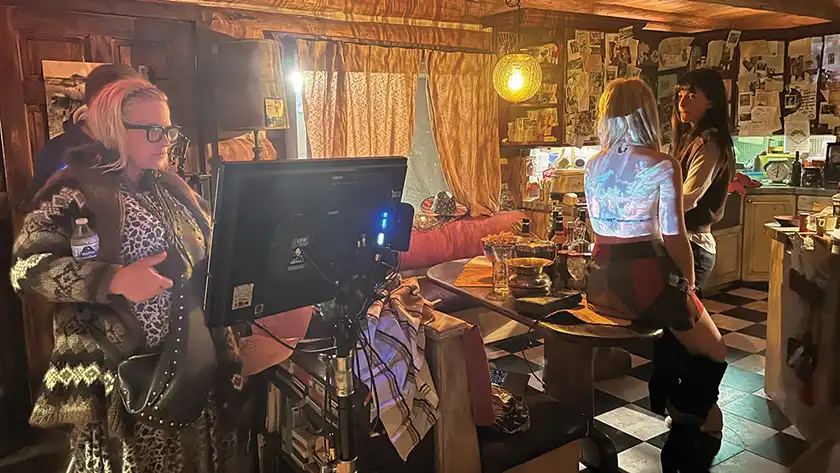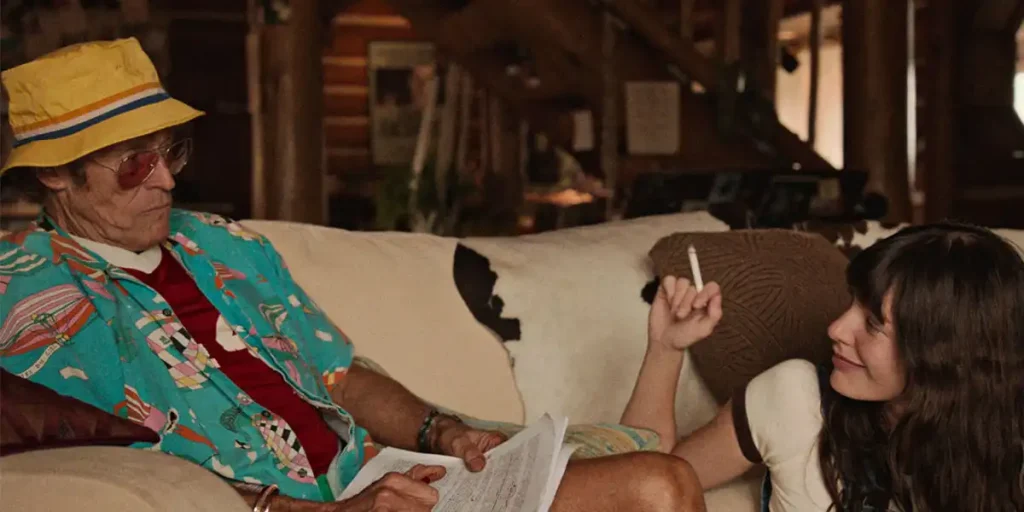Patricia Arquette’s Gonzo Girl dips in and out of a drug-fueled reality to tell the story of how one young writer found her voice.
Director: Patricia Arquette
Genre: Comedy, Drama
Run Time: 96′
Tribeca Screening: June 12, 2025 (Member Exclusive Event)
U.S. Release Date: TBA
U.K. Release Date: TBA
If there is one outstanding message from Cheryl Della Pietra’s debut novel, “Gonzo Girl”, it is that your heroes are not all that they seem. Pietra’s book told an essentially true, yet fictionalized, story based on her time as an assistant to the legendary writer Hunter S. Thompson. Thompson was a prolific writer who completely altered the world of journalism and delivered books like “Fear and Loathing in Las Vegas” and “The Rum Diaries”.
While Pietra saw her opportunity as a once-in-a-lifetime experience, she didn’t account that her hero, the father of “gonzo journalism”, would be as deeply difficult and utterly flawed as he was. Director Patricia Arquette has brought Pietra’s wild and mostly true story to the silver screen in a manner that breathes life into the character that was Hunter S. Thompson while also being realistic about what it was like to be in the orbit of such a brash yet iconic voice.
In Gonzo Girl, Alley Russo (Camila Morrone, of Daisy Jones & The Six), a 20-something struggling writer, attends what is supposed to be a live reading of one of her favorite author’s most famous books. However, the reading aspect of the event is quickly thrown out the window as the elusive Walker Reade (Willem Dafoe, of The Phoenician Scheme) tells the audience he’d rather “have it out” with them in a wild west style Q&A.
After drawing attention in the Q&A, Alley is approached by Walker’s employee, Claudia (Patricia Arquette, of Severance), whose primary task seems to be keeping Walker alive. Claudia asks Alley if she would be interested in coming to Colorado to work as Walker’s assistant, mainly managing his activities in the late nights and early morning, as she is getting too old to keep up with him during these vital hours. Alley, fed up with New York City and admittedly having no writing voice of her own, sees this as the opportunity of a lifetime.

When Alley arrives on Walker’s sprawling ranch, she begins to understand this might not be the soul-searching, writing-intensive experience she was hoping it would be. While Claudia tells Alley that Walker is in deep trouble with his publisher, having not delivered pages on a book he’s already spent his advance for, you would never be able to tell by the way Walker galvants around his property in a cocaine, acid and marijuana fueled haze.
Claudia pins Walker’s delivery of pages on Alley, making this seemingly impossible task entirely her own to bear. This poses an issue as Walker will only trust Alley if she participates in his drug-fueled madness. Desperate to deliver, Alley begins to descend into the depths of Walker’s vices while giving it her all to keep him on track. Running out of options and slipping helplessly into Walker’s world, Alley tries to see if she could maybe find her own voice through borrowing his.
Gonzo Girl is a story about a maestro of madness and a witness to the wildness who quickly begins to lose the aspects of herself that made her perfect for the job in the first place. At its heart, it’s a meditation on identity and how far we’ll go to become what we deem as the “evolved” version of ourselves.
Alley wants to be respected by Walker. When she first comes to the ranch, she sees everyone plays a very specific role in Walker’s life. His young girlfriend Devaney (Elizabeth Lail, of Five Nights at Freddy’s) ignites the wild side of Walker, happily going with the crazy ideas he puts forth. He finds a drinking and drug buddy, emulating a younger version of himself in Larry the Hollywood star (Ray Nicholson, of Borderline), who’s there to study Walker after buying the film rights to his most popular book. Alley is so quickly intoxicated by the world Walker has built on this ranch and desperately wants to become a meaningful part of it. She thinks being assigned a role on the ranch might be the push she needs to help her find her voice as a writer.
While she was initially picked because Claudia saw her as clear-headed and unafraid of standing up to Walker, she becomes an entirely different Alley while on his ranch. Her mission was to come here to find her voice and yet, by the mid-point of the film, she is no more in touch with her identity but rather just made in the images of who Walker thinks she should be.
Gonzo Girl is chock-full of promise with glimpses of a strong directorial voice just beyond the horizon. Arquette’s depiction of Walker and Alley’s drug-addled visions truly emphasizes how this experience with Walker has opened Alley up to a world she felt too uncomfortable in her own skin to explore. The film does a great job at showing the ways Alley has both changed for the better and for the worse and how the two versions of herself often butt heads.
However, the film has flaws that hold it back from making it a standout story. With a concept so sprawling and rich, the weight of the story is unevenly distributed. Moments of introspection are cut off abruptly while entertaining drug sequences are given plenty of time to land. For a directorial debut, it’s not a poorly told story but, rather, one that ironically seems to be searching for its own voice, just like Alley.
While Willem Dafoe brings the eccentric and deeply flawed Walker Reade to life, his stunning portrayal is only matched by Arquette’s calmly calculating Claudia. His performance is often left feeling imbalanced, either totally over or totally underselling Walker’s insane antics, by the unrealized potential scattered throughout the film. Camila Morrone most convincingly finds her footing in the latter half of the film, which is glorious, but realistically, too little, too late.
Gonzo Girl is an entertaining ride. Its meditations of identity and portrayal of the nuanced relationship between Walker and Alley as an utterly fascinating mentor/mentee duo serve as the beating heart of this complicated story. Arquette’s directorial debut is a valiant, albeit flawed, effort as the story she chose to adapt is by no means an easy one to approach about the actuality of meeting your heroes and the flawed reality of searching for your own voice.
Gonzo Girl: Movie Plot & Recap
Synopsis:
A young writer struggling to find her voice gets the opportunity of a lifetime as an assistant to one of her writing heroes. However, she quickly realizes this position is much more involved than she could ever imagine and in order to gain his trust, she must descend into his world of madness.
Pros:
- The story has glimmering moments of clarity that make meaningful statements about the messy reality of searching for your voice.
- The visuals in the story are stunning and guide the audience along the drug-addled visions of its main characters.
Cons:
- While Willem Dafoe completely devotes himself to this role, the acting throughout the film feels imbalanced on a general level.
- Similarly, since the story is so sprawling, the film has a hard time deciding what to give importance to.
Gonzo Girl had its US Premiere at the Tribeca Film Festival on June 12, 2025, as a Member Exclusive Event, after its World Premiere at TIFF.

